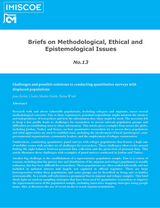Externe Publikationen

Challenges and possible solutions to conducting quantitative surveys with displaced populations
Kuhnt, Jana / Charles Martin-Shields / Ruben WedelExterne Publikationen (2019)
Rotterdam: IMISCOE (Briefs on Methodological, Ethical and Epistemological Issues 13)
Research with and about vulnerable populations, including refugees and migrants, raises several methodological concerns. Due to their experiences, potential respondents might mistrust the motives and independence of researchers and how the information they share might be used. The necessity felt to keep a low profile leads to challenges for researchers to access relevant population groups and difficulties in establishing trust to share information. This article gives examples from across the globe, including Jordan, Turkey and Kenya, on how quantitative researchers try to access these populations and what approaches are used to establish trust, including the involvement of local ‘gatekeepers’, non-governmental organizations, community leaders, and the employment of refugee enumerators. Furthermore, conducting quantitative panel surveys with refugee populations that feature a high rate of mobility comes with another set of challenges for researchers. These challenges often evolve around finding the right balance between personal data collection and the protection of personal data. This article illustrates these challenges with examples of panel surveys conducted in Jordan and Turkey.Another big challenge is the establishment of a representative population sample. Due to a variety of reasons, including that the precise size and distribution of the migrant and refugee population is usually unknown, this has been difficult for researchers. These populations are often settled informally and not included in national surveys and largely not captured in official registries. There are large heterogeneities within these populations and some groups can be described as being rare or hidden systematically. As a result, self-selection is a prominent bias in migrant and refugee samples. This brief sheds light on random sampling strategies that have been used by quantitative researchers to improve the representativeness of the population sample, including innovative mapping strategies using google maps. Also, it discusses the use of social media to reach migrant populations.Kontakt
Cornelia Hornschild
Koordinatorin Publikationen
E-Mail Cornelia.Hornschild@idos-research.de
Telefon +49 (0)228 94927-135
Fax +49 (0)228 94927-130
Alexandra Fante
Bibliothekarin/Open Access-Koordinatorin
E-Mail Alexandra.Fante@idos-research.de
Telefon +49 (0)228 94927-321
Fax +49 (0)228 94927-130




